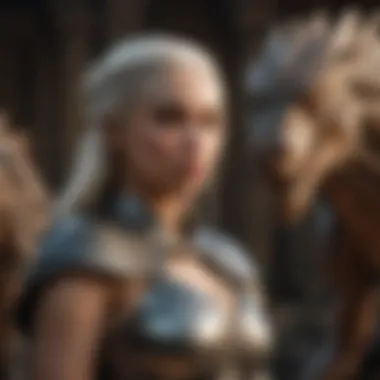Dany: The Complexity of Daenerys Targaryen’s Journey


Intro
Daenerys Targaryen is one of the most complex characters in the Game of Thrones series. Her journey is intricate, marked by transformation and impactful choices. From her early days as a meek girl in a foreign land to her rise as a determined ruler, Daenerys's character arc offers a rich ground for exploration. Understanding her motivations and the relationships she builds clarifies her evolution throughout the narrative. This section will set the stage for a detailed examination.
Character Dissections
Key Characters Surrounding Daenerys
To fully understand Daenerys, it is essential to analyze the characters that impact her life. Key figures include her brother Viserys, loyal advisor Jorah Mormont, and the powerful Tyrion Lannister. Each character shapes Dany's choices and development in their own way.
- Viserys Targaryen: Daenerys's brother represents entitlement and cruelty. His obsession with the throne affects her perception of power.
- Jorah Mormont: A figure of loyalty, Jorah’s affection and unwavering support greatly influence Daenerys's confidence.
- Tyrion Lannister: He serves as a voice of reason. His political acumen provides Daenerys with insight into the complexities of ruling.
Development Throughout the Series
Daenerys starts as a timid bride, sold into marriage to Khal Drogo. Her initial helplessness evolves over time as she embraces her identity. The crucible of hardship strengthens her resolve, gradually transforming her into a formidable leader.
Notable moments of development include:
- Her decision to stand up to Drogo, claiming her agency.
- The birth of dragons, symbolizing her connection to the Targaryen legacy.
- Her drive to free slaves, reflecting her evolving moral compass.
Impact on the Storyline
Daenerys's choices are pivotal to the unfolding of the Game of Thrones narrative. Her ambition propels her into conflict with other characters and ultimately affects the fate of Westeros. Key actions include her quest for the Iron Throne and the drastic measures she takes to assert her vision for the realm.
"Daenerys Targaryen’s pursuit of power leads to both liberation and destruction, revealing the duality of her character."
Episode Breakdowns
Significant Events in Each Season
Breaking down Dany's journey involves highlighting crucial events across seasons. For instance, her journey from Essos to Westeros is emblematic of her ambition and desire for belonging. As she captures cities like Astapor and Meereen, her actions reflect her shift from a passive pawn to a strategic player.
Key seasons of focus include:
- Season 1: Introduction to Daenerys and her early struggles.
- Season 3: The emergence of her dragons and the impact on her identity.
- Season 6: Her return to Westeros and the decisive actions that lead her closer to the Iron Throne.
Themes and Symbolism
Central themes surrounding Daenerys include power, justice, and identity. The mother of dragons symbolizes both destruction and salvation. Her journey sketches the complexity of justice in leadership—at what cost does one seek to liberate?
Lore Explorations
The Targaryen Legacy
Daenerys is deeply rooted in the lore of Westeros. The legacy of House Targaryen informs her character, from her family's history to their dragon lineage. The understanding of this background adds layers to her motivations.
Important aspects to consider include:
- The significance of dragons as symbols of power.
- The prophetic elements surrounding Daenerys, like visions in the House of the Undying.
Cultural and Mythical Ties
Westeros is rich in cultural lore. Dany's ties to the Dothraki allow viewers to explore themes from their unique customs and beliefs. This connection provides context for her character development and decisions.
Fan Theories
Intriguing Speculations
Fans have speculated about Daenerys's true fate since the beginning. Theories often center around her moral path and potential conflicts in her quest for the throne. Some popular theories explore:
- The possibility of a conflict between her and Jon Snow, highlighting family ties and political ambitions.
- The transformation of her character into a tragic figure, illustrating Shakespearean influences in her arc.
Evidence from the Show
Evaluating fan theories requires a careful look at narrative clues sprinkled throughout the series. Subtle hints in dialogue and character interactions provide a foundation for much speculation. For example, how Dany reacts to betrayal offers insight into her potential responses to future challenges.
Character Genesis
The concept of Character Genesis is vital in understanding Daenerys Targaryen's arc within the broader narrative of Game of Thrones. This section lays the groundwork for analyzing her evolution from a frightened child into a complex figure driven by ambition and a desire for power. Here, we explore foundational elements that contribute to her character's progression and the implications of her past on her future decisions.


Character genesis helps in identifying various influences and motivations that shape Daenerys’s identity. By examining the formative experiences and key relationships in her early life, the reader can gain insightful context regarding her actions throughout the series. This analysis provides clarity on the psychological underpinnings that inform her choices, including her perception of power, loyalty, and freedom. In essence, Daenerys Targaryen's genesis is not merely an origin story; it is a reflective lens into her ambitions and the obstacles she faces.
Early Life in Exile
Daenerys was born in the turbulent environment of the Targaryen exile following the overthrow of her family's rule. Her early life was marked by struggle, fear, and the quest for security. Living in a foreign land forced her to adapt quickly and understand the precarious nature of her situation. This sense of vulnerability left a lasting imprint on her psyche.
From a young age, Daenerys was thrust into a world of political scheming and survival tactics, primarily driven by her older brother, Viserys. This forced dependence on her brother shaped her views on loyalty and power dynamics. She learned to suppress her voice, fearing the repercussions of duplicity in her surroundings. These formative years are essential to understanding why she later seeks to reclaim her birthright with such ferocity.
The Role of Viserys
Viserys Targaryen, Daenerys's older brother, plays a critical role in her early development. His pursuit of the throne deeply affects her perceptions of both nobility and authority. Viserys's treatment of Daenerys oscillates between domineering and protective, introducing her to a harsh reality of masculinity that often equates power with control. This toxic dynamic fulfills two crucial functions in the narrative.
First, it positions Daenerys as the object of his ambition, reducing her agency at a crucial moment in her life. Viserys's obsessive fixation on reclaiming the Iron Throne does not include any consideration of her needs, desires, or aspirations. Instead, he sees her merely as a pawn in his game. Consequently, Daenerys grows more aware of her worth and rights as individuals through these experiences, preparing her for conflicts she will face later.
Second, Viserys's character serves as a foil to Daenerys. His perverse sense of entitlement juxtaposes her eventual emergence as a leader who values compassion and justice. The conflicts that arise from their relationship foreshadow her transformation from a pawn in someone else's game into a player who engages with complex moral dilemmas. Thus, Viserys's influence is integral to character genesis, marking the initial steps of Daenerys's journey toward self-actualization.
Transition to Power
Transition to power is a pivotal aspect of Daenerys Targaryen’s journey in the series. This phase marks her evolution from a submissive figure under the control of her brother Viserys to a fierce leader with a clear vision. In examining this transition, one can appreciate the complexity of her character and the interplay of circumstances that shape her path.
One significant element in this transition is Daenerys's marriage to Khal Drogo. This union serves not only as a means for her to gain stability but also as a catalyst for her growth. Initially viewed as a transaction, her marriage provides Daenerys with opportunity for empowerment. She gains the support of the Dothraki people and, from Drogo, experiences a shift in how she perceives herself.
The birth of dragons further illustrates her ascendancy. After enduring many hardships, the dramatic event of dragons hatching signifies a turning point. It symbolizes her connection to her Targaryen heritage and provides her with a lethal advantage in her pursuit of the Iron Throne. With dragons at her command, Daenerys transforms from a pawn into a powerful player in a deadly game.
The combination of these elements showcases breaking free from previous constraints, building her identity, and leveraging resources. Throguh these experiences, she develops her own ideals and begins to forge a path that aligns with her desires. The concept of power, therefore, is not just about ruling but also involves finding one's voice.
"A queen must be a leader, but to lead she must first discover her true self."
In exploring these moments, the article illustrates how Daenerys’s transition to power is not merely about authority but the understanding and use of her influence. It reflects her internal conflict and the external realities of her world, setting the stage for her later choices. Understanding this transition allows for a better grasp of her motivations and the tumultuous path that follows as she continues her quest for control.
The Notion of Destiny
Daenerys Targaryen's journey is closely intertwined with the concept of destiny. This notion shapes her beliefs and decisions throughout the series. Whether viewed as a guiding force or a source of burden, destiny plays a critical role in her character development. Understanding this aspect invites a deeper appreciation of her complexities.
Beliefs and Motivations
Daenerys's beliefs are rooted in her upbringing and experiences. Raised in exile, she comes to view her destiny as reclaiming the Iron Throne for her family. This belief is strengthened by the support of her brother Viserys, who often speaks of their rightful place as rulers of the Seven Kingdoms. However, this motivation is not solely about power; it also encompasses a desire to bring justice and end the suffering she witnessed in her childhood.
Daenerys develops her motivations from a blend of personal history and external influences. Her experiences inspire a fierce sense of duty towards the oppressed. The relationship with her dragons also reinforces her view of destiny. She sees them as symbols of her Targaryen identity and heritage. Together, they reflect her inner strength and growing confidence.
Despite this fervent desire to fulfill her destiny, her motivations are frequently challenged. This reflects in her evolving perspective on power, leading to both admirable actions and questionable decisions. Teaming up with Tyrion Lannister brings a more strategic dimension to her plans but also complicates her moral compass. This complexity enhances her character and underscores the often unpredictable nature of destiny.
Targaryen Legacy
The Targaryens have a storied legacy, rife with tales of fire, blood, and eventual madness. This history weighs heavily on Daenerys. She becomes acutely aware of the expectations that come with her surname. The
Allies and Adversaries
The exploration of allies and adversaries is vital in understanding Daenerys Targaryen’s journey. Her interactions with both friends and foes significantly shape her character development and influence her decisions. Daenerys’s relationships reveal much about her motivations, as well as her vulnerabilities. This section will delve into key relationships that informed her choices and highlight crucial moments of betrayal that altered her path.
Key Relationships
Jorah Mormont
Jorah Mormont stands out as a cornerstone of Daenerys's support system. His unwavering loyalty provides stability in her chaotic life. Jorah's character showcases the theme of unrequited love and sacrifice. He serves as a mentor, guiding Daenerys through her initial challenges, helping her refine her identity as a leader.
In particular, his deep-seated commitment to Daenerys, despite his mistakes, highlights the complexities of their bond. Jorah represents one of the few consistent relationships in her life, offering a blend of affection and protection. This loyalty is beneficial as it helps Daenerys navigate critical moments in her journey. However, it does come with a downside, as Jorah often acts out of personal interest, making it difficult for Daenerys to fully trust him at crucial times.
Missandei
Missandei embodies a different aspect of companionship for Daenerys. As a former slave and trusted advisor, she provides not only counsel but also a perspective on freedom and justice. Missandei’s background enriches Daenerys’s understanding of the world outside her own experience. Their friendship anchors Daenerys, reminding her of her core principles against oppression.
Key characteristics of Missandei include her intelligence and loyalty. Her role emphasizes the importance of female alliances in a patriarchal society. This relationship is beneficial because it empowers Daenerys to manage her decisions with moral clarity. However, Missandei's tragic fate becomes a moment of loss, showcasing the vulnerabilities inherent in trusting others.
Tyrion Lannister
Tyrion Lannister introduces a political dimension to Daenerys’s leadership. His sharp mind and strategic thinking present innovative methods of ruling, which contrasts with her initial, more emotionally driven approach. Tyrion's experience in Westeros politics equips Daenerys to understand the complexities of power dynamics better. His counsel is often rooted in pragmatism, which aids Daenerys during times of crisis.
Tyrion’s character adds a layer of skepticism and insightful analysis. He challenges Daenerys in ways that others do not, fostering growth. This relationship is beneficial as it helps Daenerys develop a more rounded perspective on leadership. However, Tyrion’s manipulative nature can create tension, complicating their relationship and leading to pivotal moments when their goals diverge.
Moments of Betrayal


Rhaegar's Legacy
The legacy of Rhaegar Targaryen haunts Daenerys throughout her quest for power. This informs her perception of duty versus desire. Rhaegar's choices ultimately lead to significant betrayals, shaping the path of her family and the power struggle in Westeros. The memory of Rhaegar creates an emotional burden for Daenerys; she must reconcile her ambition with the mistakes of her brother.
Key characteristics of Rhaegar’s legacy include its tragic and mythic qualities. It is a popular choice for this article as it connects Daenerys deeply to the historical trajectory of her house. However, the romanticization of Rhaegar can lead to unrealistic expectations from Daenerys, complicating her own identity crisis and sense of responsibility.
Varys’s Dilemma
Varys’s actions represent the betrayal of trust that profoundly impacts Daenerys. As a master of whispers, he is caught between serving the realm and pursuing his own agenda, which includes planting seeds of doubt about Daenerys’s leadership. This internal conflict is vital, as it exposes the fragility of alliances in power struggles.
Varys's duality as a character offers a beneficial insight into the ethics of leadership. His manipulative nature emphasizes the dangers of absolute power and blind loyalty. However, his betrayal at a crucial juncture reveals how easily trust can be shattered, adding layers to Daenerys's already complicated journey.
"Broadly, the dynamics of allies and adversaries shape the landscape of Daenerys Targaryen’s formidable quest for the Iron Throne."
Leadership vs. Destruction
The theme of leadership versus destruction is critical in understanding Daenerys Targaryen's character development. This juxtaposition encapsulates her journey from a hopeful liberator to a feared tyrant. Daenerys embodies the dual capacity of leaders to inspire change while also having the potential to unleash chaos. In this section, we explore how her rise to power is marred by decisions that lead to destruction, challenging the idea of effective leadership.
The Rise of Dany as a Leader
Freeing Slavery in Essos
Daenerys’s commitment to freeing slaves in Essos marks a pivotal moment in her leadership journey. She takes a bold step when she confronts the institution of slavery itself. Her decision to abolish slavery in places like Astapor and Yunkai demonstrates her ardent desire for justice and equality. This choice is significant as it positions her not just as a ruler, but as a champion of the oppressed.
The key characteristic of this action is Daenerys's moral conviction. She believes that it is her duty to liberate those who cannot free themselves. Such noble intentions resonate with many people in Westeros. However, one cannot overlook the complexities that arise. The freeing of slaves often leads to chaos and power vacuums. This, in turn, raises questions about the possible pitfalls of her approach to leadership.
- Advantages: Daenerys’s decisions win her many followers. They view her as a savior, which solidifies her power base.
- Disadvantages: Her liberating actions sometimes result in unintended consequences. The anarchy left in the wake of deposed masters complicates her quest for peace.
Political Ambitions
Ambition is a defining trait for Daenerys. Her political ambitions facilitate her ascent as a leader. She aims to reclaim the Iron Throne for the Targaryens while promoting values she holds dear. This ambition drives her, but it also blurs the lines between right and wrong in her quest.
One notable feature of her ambitions is her strategic alliances. Daenerys often seeks to strengthen her claims through marriages and coalitions, demonstrating her understanding of political machinations. This is essential when trying to unite various factions under her rule.
- Advantages: Her ambitions establish her as a significant player in the power dynamics of Westeros. They reflect her determination to create a legacy.
- Disadvantages: Overreliance on ambition can lead to trust issues with allies. Daenerys’s single-minded focus occasionally alienates potential supporters.
Transformation into the 'Mad Queen'
Actions in King's Landing
The moment Daenerys’s leadership turns to destruction is evident in her actions within King’s Landing. Her decision to attack the city, despite the surrender, is the point where her character transformation becomes radical. In this instance, the formerly compassionate liberator reveals her darker tendencies.
This dramatic shift is critical to analyzing her journey. The key aspect here is the abandonment of her principles. Rather than seeking peace, she opts for total domination, demonstrating the destructive potential of unbridled power. The choice to burn the city leads to severe consequences and a firestorm of criticism.
- Advantages: This act consolidates her power, instilling fear among her adversaries.
- Disadvantages: It alienates many of her remaining supporters. Her vision is now marred by the dark reality of mass destruction.
Moral Ambiguity
Moral ambiguity is a constant theme in Daenerys’s journey. Her evolution raises questions about morality in leadership. Decisions made in the name of a higher goal often lead to ethical dilemmas. In Daenerys’s case, the line between hero and tyrant becomes increasingly blurred.
A key characteristic of this ambiguity lies in how her motives are perceived. Proponents argue that her ultimate goal of a free world justifies her ruthless measures. Critics, however, see a descent into tyranny that undermines her initial ideals. This paradox encapsulates the idea of leadership in a world rife with conflict.
- Advantages: The complexity of her character fuels rich discussions about leadership ethics.
- Disadvantages: This ambiguity leaves her legacy tarnished, complicating how future generations will view her.
"Leadership is not just about strength; it's also about the choices made under duress of power."
In examining leadership versus destruction in Daenerys Targaryen's journey, we see a deeply flawed but compelling character. Her actions might inspire, but they also illustrate that the path to power is littered with moral quandaries.
Symbolism of Fire and Blood
The symbolism of fire and blood plays a critical role in understanding Daenerys Targaryen's journey throughout the Game of Thrones series. This twin motif underscores her identity and her connection to the Targaryen legacy. Fire represents her dragons and the power she has over destruction and rebirth, while blood not only signifies her lineage but also embodies the toll of her ambition. These elements weave together to reflect her internal struggles and external conflicts as she navigates her path toward power.
Fire: Birth and Destruction
Fire is a potent symbol within Daenerys's narrative. It encompasses both life and death, creation and annihilation. The birth of her dragons from the flames marked a transformative moment for Daenerys, signaling her emergence as a formidable force in Westeros. These dragons, as extensions of her will, embody strength and terror, aligning with her desire to reclaim the Iron Throne.
Fire also serves as a reminder of destructivness. Daenerys often grapples with the duality of her actions: liberating some while obliterating others. For instance, her fiery assault on King's Landing illustrates the catastrophic consequences of her choices. It serves as a climax to her arc, showcasing how raw power can corrupt even noble intentions. This destructive element of fire poses critical questions about the nature of leadership and the heavy costs associated with the pursuit of power.
Blood: The Targaryen Code


Blood signifies more than just family ties for Daenerys. It is a representation of the Targaryen code, which dictates loyalty, sacrifice, and often violence. Throughout Game of Thrones, Daenerys grapples with her identity as a Targaryen, marked by both privilege and peril. Her bloodline brings with it an expectation of greatness, burdening her with the complicated legacy of past rulers.
The notion of blood ties plays a significant role in her relationships. For example, her strong bond with her brother, Viserys, reflects both loyalty and the toxic elements of their upbringing. Furthermore, the idea of pure Targaryen blood shapes myriads of political dynamics. Daenerys often feels compelled to prove her worthiness as a ruler, resulting in choices that intertwine her notions of family and ambition. This dual focus on bloodlines can lead to unexpected betrayals and alliances, ultimately illustrating the fragility of loyalty within the quest for power.
"The blood of the dragon cannot be denied. It binds us to our past, rooted in glory and stained with loss."
The complexities surrounding fire and blood are critical in analyzing Daenerys's character. These symbols encapsulate her internal dilemmas while illuminating the narrative's exploration of power, legacy, and the moral quandaries inherent in leadership.
Feminism and Power
The exploration of feminism in the narrative of Daenerys Targaryen brings forth important discussions about power and gender dynamics in a patriarchal society. Daenerys's journey from a powerless girl to a strong leader highlights the nuances and difficulties of female empowerment. Throughout the series, her character confronts societal expectations and faces opposition that frequently undermines her authority. Feminism, in this context, is not just about achieving power; it is also about the methods employed to attain it and the impact on the characters and society around her.
Dany as a Feminist Icon
Daenerys Targaryen serves as a complex feminist icon. She embodies traits that can empower some audiences while simultaneously eliciting criticism from others. After her early life submerged in fear and control, Dany rises to power, taking significant steps that challenge the norm. She actively works to dismantle the system of slavery in Essos, which reflects her fight against oppression.
- Key elements that showcase her role as a feminist icon include:
- Agency: Despite beginning as a pawn in the hands of men, Dany gradually asserts her independence. Her marriage to Khal Drogo is an act of political ambition rather than submission.
- Leadership: As a ruler, she seeks to create a better world, defining her goals on her own terms rather than conforming to traditional female roles.
- Resilience: Dany faces repeated personal losses, yet she persistently drives towards her ambitions, showcasing a determination that resonates with many.
However, her depiction is not without contention. Critics argue that her path to power tarnishes the feminist narrative. Some believe that her evolution into a feared figure transitions her from a liberation motif to a tyrant, challenging the effectiveness of her role as a feminist figure.
Critiques of Her Leadership Style
The critiques surrounding Daenerys's leadership style delve into her methods and decisions during her quest for power. While she is often celebrated for her efforts to free the oppressed, there are significant debates about the consequences of her actions.
- Important considerations regarding her leadership include:
- Moral Dilemmas: Dany experiences shifts in moral clarity. Her decision-making, particularly in later seasons, draws scrutiny from viewers. Many question whether her ends justified the means.
- Strategic Flaws: Her reliance on a select group of advisors can be seen as problematic, limiting diverse perspectives that could inform her leadership.
- Power Dynamics: Critics highlight the irony in her quest for justice, which sometimes mirrors tyrannical behavior, thus complicating her legacy as a figure of empowerment.
"Feminism is about choice; Daenerys's choices often highlight the weight of her responsibility rather than merely rocking the boat of power."
In summary, Daenerys Targaryen's narrative intricacies offer fertile ground for discussions on feminism and power dynamics. Her story embodies the relentless struggle for autonomy and challenges the very essence of leadership through a feminist lens. As viewers engage with her character, they are faced with questioning not only the nature of power but also the ethical implications of its pursuit.
Critical Reception
The critical reception of Daenerys Targaryen's journey in Game of Thrones is a multifaceted topic that warrants thorough examination. Analyzing this aspect enables one to understand the series' broader implications and the complexity of its characters. Daenerys is one of the most scrutinized figures, experiencing shifts in audience perception throughout the seasons. Critics and fans alike have provided insights into her changing narrative, reflecting societal values and expectations of leadership, power, and morality.
Fan Theories and Expectations
Fans of Game of Thrones have contributed significantly to the dialogue surrounding Daenerys's character through various theories and expectations. As her story unfolded, many viewers held onto hopes and predictions about her fate and role in the series. These theories often reflect deeper themes concerning justice, tyranny, and the morality of power.
- The Dragon's Fate: Some fans speculated that Daenerys' dragons would ultimately lead to her downfall, viewing them as both her strength and her curse.
- Potential Alliances: Various theories explored potential alliances Daenerys could form, especially with characters like Jon Snow and Tyrion Lannister, stressing the importance of unity in her quest for the Iron Throne.
- Legacy of the Targaryens: Several fans theorized how Daenerys might either fulfill or break the Targaryen legacy, particularly in relation to the infamous implications of being a "mad" ruler.
These theories shaped audience expectations, crafting a narrative thread that the series ultimately had to address.
Controversy in the Final Episodes
The final episodes of Game of Thrones ignited considerable debate around Daenerys’s character development and choices. Many viewers noted a significant departure from her previously established values. This shift marked a stark contrast between her earlier portrayals as a liberator and her later actions seen as tyrannical. The depiction of her descent into what some called the 'Mad Queen' spurred both criticism and discussion.
- Character Consistency: Critics questioned the consistency of Daenerys’s character arc. Some viewers felt that her transition from benevolent leader to power-driven monarch lacked sufficient buildup in the narrative.
- Audience Expectations: The disparity between fan theories and the series' resolution raised frustrations. Many expected a more nuanced conflict within Daenerys regarding her grasp for power, so her switch to aggression felt jarring for some.
- Feminist Interpretation: Discussions surfaced about the representation of female power in media. Some advocates argued that the portrayal of Daenerys’s final choices undermined the feminist progress evident earlier in her story.
"The ending reflects a broader critique of power itself, regardless of gender. Daenerys’s choices stir deep ethical conversations about leadership and sacrifice."
In summary, the critical reception of Daenerys Targaryen showcases how a character can evolve and polarize an audience. Her journey intersects with numerous cultural and societal dialogues, reflecting varying perspectives on power, morality, and legacy. The reactions towards her arc and fate reveal much about audience expectations and the intricate nature of storytelling in a series that spans complex themes.
Cultural Impact
The cultural impact of Daenerys Targaryen's character is significant and multifaceted. Her journey from an exiled princess to a powerful queen resonates with themes of power, gender, and morality. In a world dominated by patriarchal structures, Daenerys embodies a figure of strength and complexity, becoming a symbol of both empowerment and ethical ambiguity. This duality encourages discussions about leadership and the responsibilities that come with power.
Daenerys's storyline also dialogues with contemporary issues. Her initial desire for justice and liberation evolves into a quest for domination, sparking debates on the nature of heroism and tyranny. As such, Daenerys Targaryen stands as a reflection of the complexities inherent in the pursuit of change.
Legacy in Pop Culture
Daenerys's character has left a lasting mark in pop culture. From her first appearances in Game of Thrones, she has influenced a generation of viewers. Her ascent to power is not just about her as a character, but rather the archetype she represents.
- Merchandise and Ads: Daenerys-themed items proliferate the market, showcasing her influence. This includes apparel, collectibles, and even home décor.
- Memes and Quotes: Her iconic lines and scenes have become widely recognized and referenced across various social media platforms. For instance, phrases like "I will take what is mine" exemplify her fierce resolve and have taken a life of their own online.
- Spin-offs and Adaptations: The House of the Dragon series, focusing on the Targaryen lineage, arises from the success of Daenerys's character arc, showing that her legacy continues to inspire creators and audiences alike.
Moreover, her character has been analyzed in various forms of media, including books and documentaries. This affects how stories about women and power are presented, encouraging more nuanced portrayals in future productions.
Influence on Contemporary Discussion
Daenerys's journey has catalyzed conversations around gender roles, morality in leadership, and the effects of ambition. Her complexities have made her a case study in understanding the consequences of power.
- Gender and Power: Discussions about how she navigates her position in a male-dominated world speak to contemporary feminist dialogues. Her character challenges the traditional notions of power and femininity, bringing forth a richer understanding of leadership.
- Moral Complexity: The ethical dilemmas she faces prompt viewers to reflect on what constitutes a "just" leader. Her transformation from liberator to conqueror invites analysis of the grey areas in morality and the fragility of ideals.
- Streaming and Social Media: As a cultural phenomenon, the discussions surrounding her character have transcended television. Platforms like Reddit often host debates exploring her decisions, analyzing fan reactions, and forming theories about her motivations.
In summary, Daenerys Targaryen's cultural impact stretches beyond her narrative, influencing how power is perceived, how gender shapes leadership, and how stories unfold in popular media. Her character not only entertains but also inspires deep reflection on the fundamental aspects of humanity.



